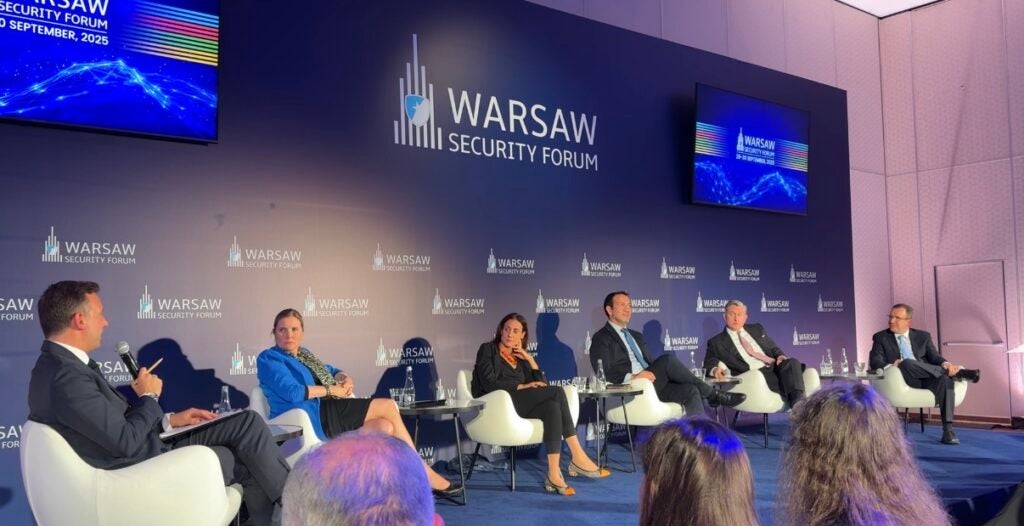


WARSAW, Poland—American experts hit back at European scholars on the war between Hamas and Israel and use of the term “genocide” when referring to Gaza during the Warsaw Security Forum.
The U.S. is “the only government in the world able to influence Israel and actually stop some of its actions,” according to Marcin Buzanski, director of Poland’s Center for Diplomacy and Negotiation at Collegium Civitas. But right now, Buzanski continued, the U.S. is being viewed by some as a “culprit” in “mass casualties” and the “destruction of Gaza.”
“I’m thinking, how does that look to you strategically,” Buzanski questioned Rob Greenway, director of The Heritage Foundation’s Allison Center for National Security.
There are “four vital national strategic interests” the U.S. has in the Middle East, and resolving the Israel-Palestine conflict “is not of them,” and “hasn’t been for decades,” Greenway said.
Instead, U.S. interests in the Middle East, according to Greenway, are first, “stability of global energy markets. The second is stability of global trade. The third is the prevention of proliferation of weapons of mass destruction. And the fourth is counterterrorism.”
What Europeans will observe in the Middle East, Greenway said, is “the U.S. administration supporting our strategic partner in the region to ensure that it is not under direct threat.”
For Israel’s part, Greenway continued, Jerusalem will risk European sanctions and restrictions to ensure it is secure in the region, “and the United States will support them in the pursuit of this,” he said.
“There’s no formulation in which we support Hamas or [any group] closely resembling it. It will never occur, and it cannot occur,” Greenway told his fellow panelists at the meeting of foreign policy experts from around the globe.
If Hamas, as the ruling government in Gaza, “decides to conduct an Oct. 7 level attack, if you’re concerned about the conduct of war, you should probably not start one,” Greenway said.
Hamas killed 1,200 people in Israel on Oct. 7, 2023, and took another 251 hostage, of whom nearly 50 are still in Gaza and 20 are believed to be alive. About 64,000 Palestinians have been killed in the war, according to Gaza’s Health Ministry.
The war will end in Gaza, Greenway added, but “it certainly is not going to include Hamas, or anything like it, in charge of Gaza.”

The panel discussion, which ran for nearly two hours, included two Americans, three Europeans, and a representative of Qatar who, during his remarks, said a “brutal occupation” was occurring in Gaza and the West Bank on Oct. 6, 2023.
“So, history did not start on Oct. 7. Of course, it’s a horrific day, and attacks and everything, but there’s an occupation. So, we want to find a long-term, sustainable solution,” Adel Abdel Ghafar, director of the Foreign Policy Program at the Middle East Council for Qatar, said.
Ghafar, along with Nathalie Tocci, director of the Istituto Affari Internazionali in Italy, claimed Israel is responsible for a “genocide” in Gaza.
Genocide, according to the United Nations, is defined as “acts committed with intent to destroy, in whole or in part, a national, ethnical, racial or religious group.”
Noticing expressions of disagreement from Greenway and Ilan Berman, senior vice president of the American Foreign Policy Council and the other American on the panel, moderator Buzanski asked for response, but not before noting that “ethnic cleansing” and a “war crime” are occurring in Gaza.
“If October the 6 was an untenable position, the solution was not October the 7,” Greenway said, adding that the very communities who lived near the border of Gaza in Israel and who were attacked on Oct. 7 were considered the greatest supporters of the two-state solution.
While not a genocide scholar, Berman, as he pointed out, has taught “international law and international humanitarian law for a quarter of a century,” and took specific issue with calling the war in Gaza a “genocide.”
“For some reason, we’ve been conditioned to think that if we don’t call something that’s terrible, where mistakes have been made, where there are people who are suffering … the most extreme thing, we’re somehow doing a disservice. I would actually argue that that’s not the case,” Berman said.
Not to diminish the hardship of the Palestinians, Berman stressed that war can “be lawful, but it’s still awful.”
Related posts:
- Deal or No Deal? Why Israel Launched Ground Attack in a Gaza City It Hadn’t Entered Since War Began
- Israel to Permit Aid Airdrops Into Gaza as Tensions Grow Over Humanitarian Situation
- Netanyahu Outlines Israel’s Plan for Taking Control of Gaza
